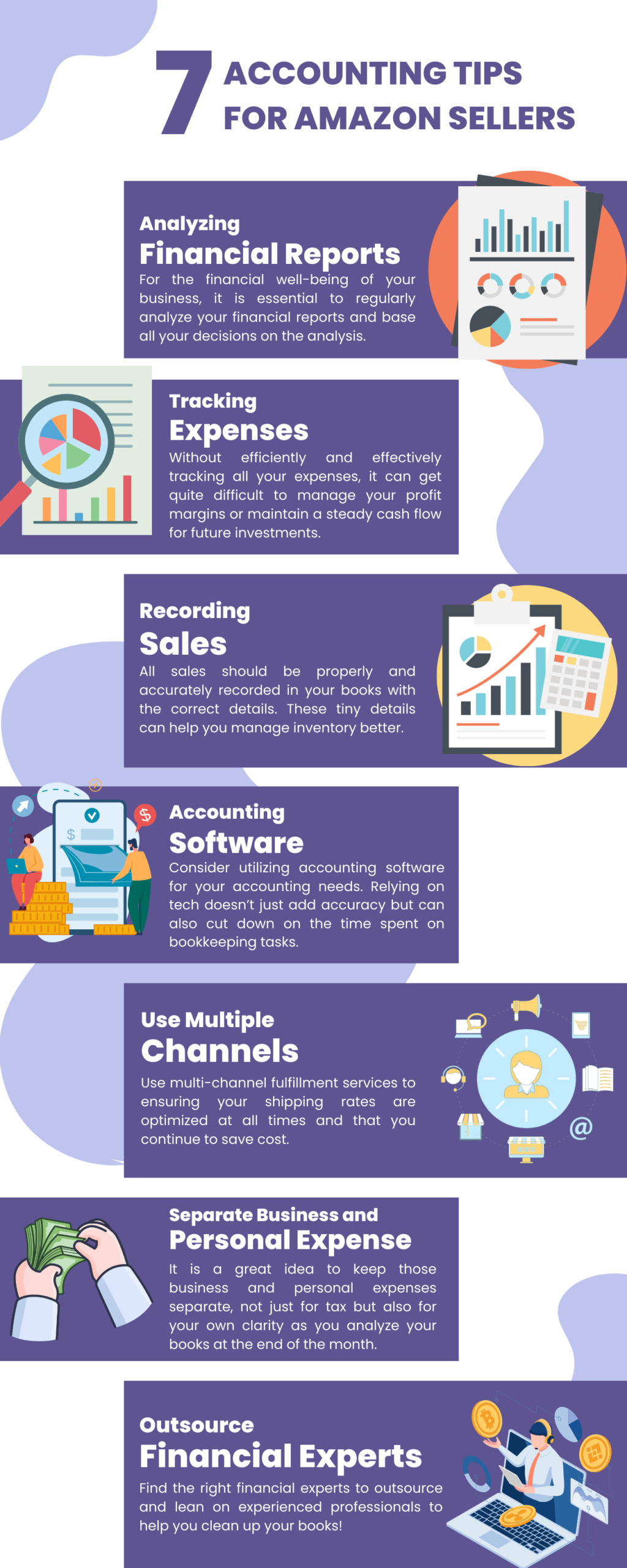Amazon Seller Accounting: Top Strategies for Financial Success

When to Hire an Interim CFO for Your Startup?
July 19, 2024
A Detailed Guide to Shopify Bookkeeping: Best Practices for E-commerce Businesses
August 2, 2024Amazon Seller Accounting: Top Strategies for Financial Success
Taking care of your books is an integral part of an Amazon seller’s business. Often, it is one of the only things Amazon sellers can adjust to reach their growth objectives. Without maintaining accuracy in financial records, making the right decisions for your business is quite impossible. This guide discusses Amazon seller accounting tips to get you to meet those targets in 2024!
With multiple things to keep track of, such as inventory records, sales, expenses, and regulatory requirements which include taxation, even getting started can be quite difficult. Luckily for you, we have prepared a blueprint you can use to wade through the confusion!
By following the trusted tips below, you can ensure accurate and secure financial records that are in good shape for potential investors to look into as well as for you to analyze the future of your business. Let’s dive right into our guide for accounting for amazon sellers!
Why is Amazon Seller Accounting More Important than Ever Before in 2024?
Building a successful e-commerce empire might have been easy in the past, yet with the rising interest rates, inflation, and a general downward trend in the growth of the economy, not all e-commerce businesses can come out on top.
Accounting for Amazon sellers is more important today as the industry experiences revolutions in terms of technological updates. Many businesses, especially startups, have started to use these tech influences to boost efficiency for their accounting records, and so should you.
Here are some of the reasons Amazon seller accounting is the need of the century!
1. Growth Can Be Difficult to Stabilize
We all know the rate at which e-commerce businesses are growing. In fact, we have to be aware of these growth rates as up-and-coming business people. The world population continues to experience a boom, and with that comes more people spending billions of dollars on goods that can easily be procured online.
As tech updates make buying even easier, this demand is going to grow over the next few years. With rising demand comes increasing levels of inventory that can often be impossible to manage. This can put significant pressure on Amazon sellers and make it harder for their business to stabilize.
Failing to keep track of finances efficiently would eventually lead you to a position where you are out of cash way before all your orders have been satisfied. Knowing when to stock what type of items is closely connected with your accounting techniques and the software you use, so it is essential to choose wisely.
2. The Post-Covid Economic Downturn is Difficult to Face
Let’s face it; the post Covid-19 era has pushed many e-commerce businesses into quite a lot of difficulties. The costs associated with selling on Amazon, such as shipping, packaging, and much more, have fluctuated significantly, and remain turbulent.
Moreover, the shifting labor mindsets and the tendency to opt for remote work have impacted the cost of labor as well as the availability. Advertising costs also increase as more businesses hope to get an edge in a competitive atmosphere. With Amazon increasing FBA fees in 2023, efficient accounting for Amazon is essential.
Better bookkeeping systems can allow Amazon sellers to quickly identify and prepare for negative trends and make better decisions regarding their cash flow and expenditure. Cash flows, balance sheets, and income statements should be reviewed on a monthly basis, especially for businesses that are just starting out.
3. Complex Seller Channels
E-commerce businesses do not just rely on one channel to make all their sales anymore. With the boom in online selling, most Amazon sellers are resorting to multi-channel sales and other marketing platforms as well as accounting software to boost their sales.
With the rise in sales comes regulatory bodies such as the IRS attempting to ensure e-commerce businesses pay their way as they grow. With these complexities, it is essential to have a sound bookkeeping strategy to help you get through it all!
 7 Amazon Seller Accounting Strategies for Proven Success
7 Amazon Seller Accounting Strategies for Proven Success
This quarter, our experts put their heads together and drafted 7 key strategies to help Amazon sellers through all the concerns they face when operating on the platform. The following strategies can bring accuracy and discipline to your accounting records.
1. A Sound Analysis of Financial Reports and Statements
Embarking on an in-depth analysis of your financial reports and statements is important if you want to understand whether your business is maintaining its financial health. You can begin by identifying certain key financial metrics that are important to you.
Essential financial metrics include gross and net profit, sales revenue, expenses, cash flow, return on investment, and much more. Start by comparing the performance of your business with the benchmarks set by the industry and attempt to understand whether your business is experiencing financial trouble. Monthly analysis can also help you make better decisions as you identify gaps that you can improve upon.
Accounting for Amazon sellers which is focused on accurate results and identifying issues ahead of time can push for better business growth rates and profitability. You can identify whether it is time to remove a product from your inventory or increase supply for a product that is doing well for itself. This also allows you to figure out better pricing and marketing strategies and more ideas for investment.
Amazon seller accounting should also involve reviewing your books to check for any discrepancies or errors that can impact your end-of-year results and, subsequently, your decision-making. It should also consist of monitoring financial trends and staying updated. This allows you to make the right decisions to fuel business growth.
2. Expense Management
To effectively manage your Amazon seller accounting, start by utilizing tried and tested Amazon accounting tools to keep track of all expenses and sales data. These tools provide a clear outlook of where your money is being spent and identify potential areas for cost savings.
Regular analysis and categorization of expenses helps you keep an eye on areas where efficiency can be improved. You can consider making use of advanced accounting software to monitor and manage all types of expenses, including fees, inventory, shipping, and other operational costs.
3. Sales Recording and Categorization
Accurate recording and categorization of sales transactions are a must if you want to maintain precise financial records for your Amazon business. Start by ensuring each of your sales transactions are accurately captured, including details like the date, customer information, product specifics, and sale amount. You can also consider categorizing transactions appropriately into types such as product sales, fees, and refunds.
All sales and revenue must also be accurately documented in your accounting system, paying special attention to the correct categorization of each transaction. Utilizing accounting software can simplify this process, ensuring accuracy and compliance with accounting standards and tax regulations.
Regularly reconciling sales transactions in your accounting software can take your Amazon seller accounting to the next level as it helps identify and correct any discrepancies. If you choose to adhere to these practices, it can ensure accurate financial records for you in the long run, support informed business decisions, and guarantee compliance with accounting and tax requirements!
4. Utilizing Accounting Software for Your Business
With the subtle yet gradual increase in competition between e-commerce businesses, it is essential for any new startup to be able to understand and use accounting software just as well as any other business out there.
Accounting tools can add efficiency to bookkeeping tasks from tracking expenses and revenue to generating complete financial reports, saving time and reducing human error. Whether you run a small business or a large corporation, adding accounting software to the mix can enhance financial management and inform better business decisions.
Here are some accounting software options to consider for Amazon FBA accounting:
- QuickBooks Online: Offers features like invoicing, expense tracking, and financial reporting. It integrates with Amazon seller accounts for automatic synchronization of sales, fees, and expenses. Starting at $25 per month.
- Xero: Known for its user-friendly interface and advanced reporting, it integrates with Amazon seller accounts to provide real-time updates on sales and fees. Starts at $20 per month.
- TaxJar: Sales tax automation software that helps manage sales tax obligations for Amazon sellers. Integrates with Amazon seller accounts to accurately calculate and file sales tax. Pricing starts at $19 per month.
5. Multi-Channel Fulfillment
Amazon seller accounting should go way beyond the platform. For sellers hoping to make a mark, it is essential to rely on multiple channels. This can increase your chances of meeting customer expectations for timely and accurate order delivery.
These platforms offer integrated features for tracking inventory, automating packing, and assigning delivery routes, reshuffling shipping operations to their best abilities, and improving the customer experience.
Effective use of these services can help businesses manage their products efficiently from the factory to the consumer.
6. Keep Business and Personal Expenses Separate
A huge part of Amazon FBA accounting is understanding which entries are important. This is why, keeping your business and personal expenses separate is of the utmost importance. It provides you with greater clarity and simplifies the tax process when the time comes.
This separation makes your financial statements and metrics much more visible. You have a better idea of your expenses and can keep them separate from personal ones that don’t affect the business. It also helps you understand the business’s financial health and the potential for future investments
7. Outsource Your Amazon FBA Accounting Requirements
For Amazon FBA accounting, seeking professional financial advice can be invaluable, especially if you lack experience in budgeting or financial management. Professional advisors can offer expert guidance on budgeting, cash flow management, and overall financial strategy, ensuring your business remains financially healthy and poised for growth. Luckily for you, we have just what you need.
Get Access to Monily’s Financial Experts and Boost Growth for Your Business
It is time to access the best support Monily has to offer. Our financial experts can help you make the most of the strategies listed above and provide many more capabilities that allow you to scale your business sustainably and successfully. Want to learn more about how we can help? Contact us today!
Nida Bohunr
A highly skilled accounting professional at Monily, having extensive and diverse experience of working in US healthcare and agriculture industry. Nida is a CA finalist with expertise in Bookkeeping, Auditing, Bank Liaison, Tax Preparation, Accounts Payable, Accounts Receivable.


 7 Amazon Seller Accounting Strategies for Proven Success
7 Amazon Seller Accounting Strategies for Proven Success

